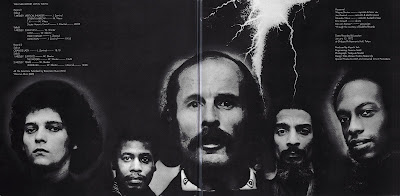Label: CBS/Sony – SOPJ 12~13-XR
Series: SX68Sound
CBS・ソニーレコード株式会社
CBS/SONY Records Inc. ‹Tokyo Japan›
Format: 2 x Vinyl, LP, Album / Country: Japan / Released: May 1, 1972
Style: Fusion, Jazz-Rock, Free Improvisation
Recorded Live at "Shibuya Kokaido Hall", Tokyo, Japan, January 13, 1972.
Design – Eiko Ishioka, Yoshio Nakanishi
Photography By – Tadayuki Naitoh
Engineer – Susumu Satoh
Producer – Kiyoshi Itoh
All selections published by Barometer Music (BMI) except "Doctor Honoris Causa" published by Zawinul Music (BMI)
Other (Cat# Disc 1): SOPJ-12-XR
Other (Cat# Disc 2): SOPJ-13-XR
Matrix / Runout (Side A, runout, etched): SOPJ-12A3 1 A 4
Matrix / Runout (Side B, runout, etched): SOPJ-12B1 1 B 1
Matrix / Runout (Side C, runout, etched): SOPJ-13A3 1 A 5
Matrix / Runout (Side D, runout, etched): SOPJ-13B1 1 A 13
side 1
A - Medley: Vertical Invader - Seventh Arrow - T. H. - Doctor Honoris Causa ........... 26:12
side 2
B - Medley: Surucucu - Lost - Early Minor - Direction ............................................... 19:08
side 3
C - Orange Lady ........................................................................................................ 18:10
side 4
D1 - Medley: Eurydice - The Moors ........................................................................... 13:42
D2 - Medley: Tears - Umbrellas ................................................................................. 10:26
Personnel:
JOE ZAWINUL / piano, electric piano
WAYNE SHORTER / soprano saxophone & tenor saxophone
MIROSLAV VITOUS / double bass, electric bass
ERIC GRAVATT / drums, percussion
DOM UM ROMAO / percussion
Very Rare Vinyl:
WEATHER REPORT Live In Tokyo (1972 / Original Japanese CBS Sony label 'SX68 Sound' issue 5-track double vinyl LP featuring the fushion outfit's first Live album, recorded at one of the five sold out concerts at the Shibuya Kokaido Philharmonic Hall in Tokyo. Comes with the Japanese sleevenotes printed insert plus the 'SX68' top obi-strip / SOPJ-12~13XR)
The only live release from the first era of WR, the Vitous-era, the one I consider the most essential and certainly the most adventuresome. Man, this is experimental with little in the way of melody, but with a lot of jazz. Brilliant..!!!...
On January 4, 1972, Weather Report launched its first tour of Japan with a concert at Shibuya Public Hall in Tokyo. It was the one of eight performances on the tour, five of which took place in Tokyo. The last of those concerts (January 13th) was recorded and released in Japan as the double-LP Live in Tokyo, parts of which also comprise the second side of I Sing the Body Electric, released later in the year.
Weather Report’s appearances were much anticipated by Japanese jazz fans. The group’s first album received several awards from Swing Journal (Japan’s leading jazz magazine), and CBS Sony rolled out the red carpet upon the band’s arrival at the airport, presenting each member with flowers and a limousine. At a press conference held the day of the first concert, the musicians were also given traditional Japanese umbrellas made of bamboo and oil paper—a nod to the band’s name.
Without question the band was inspired by the first-rate music halls and large, respectful audiences for which they performed. “When we went to Japan,” Zawinul recalled, “we didn’t know what kind of a response we would get, but I couldn’t believe what happened. We thought, ‘What are we gonna do with these Japanese people, man?’ They’re so beautiful, such wonderful listeners, but laid back. That was their culture. So we said, ‘Let’s hit ’em hard, right from the first note,’ and we hit ’em hard.” Joe later told future Weather Report band members that their gig in Sapporo was the best one the band ever played.
In some sense jazz performances are always a bit of a ritual, but this seems like an immersive experience. A friend called this album “savage” Weather Report. And I always liked what Joe said later, “Let’s hit ’em hard, right from the first note.” Indeed, they did.
This double vinyl, Japanese import, contains frenetic performance of the group from that concert -- and as such, it is a revelation. Now we can follow the wild, stream-of-consciousness evolution of early Weather Report workouts, taking the listener into all kinds of stylistic territory -- from Joe Zawinul's lone acoustic piano to dissonant free form and electronic explosions -- with lots of adjustments of tempo and texture. The pulse of jazz is more evident in their work here than on their American albums, and the example of Miles Davis circa the Fillmore concerts directs the fierce interplay. In his subsequent recordings with Weather Report, and as a leader, Wayne Shorter would rarely equal the manic intensity he displayed in Tokyo. All of the music is encapsulated in five lengthy "medleys" of WR's repertoire, three of which contain elongated versions of themes from the group's eponymously titled debut album from 1971. This would be the radical apogee of Weather Report on live records.
A masterpiece, surely Weather Report's best album ever.
Note:
All in all, it was a far cry from the club scene where most of Weather Report’s early U.S. appearances took place. There’s more about this tour in book "Elegant People: A History of the Band Weather Report" (Curt Bianchi), which I recommend in a friendly way.

.jpg)

.jpg)






%20+%20zrno%20-%20o%C5%A1trije.jpg)

%20+%20zrno%20-%20podloga%20-%20popravak%20-%20OVO.jpg)





%20+%20zrno%20-%20OVO-OK%20-%20popravak.jpg)

%20+%20zrno%20-%20var%201%20-%20OVO-OK%20-%20ipak%20OVO.jpg)





%20-%20reljef%20-%20popravak%20-%203%20-%20zrno.jpg)

-1%20+%20-%20zrno%20-%20var%2044%20-%20OVO-OK-OK-%2011111.jpg)






.jpg)

.jpg)

.jpg)






.jpg)

.jpg)








